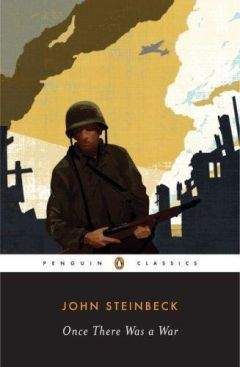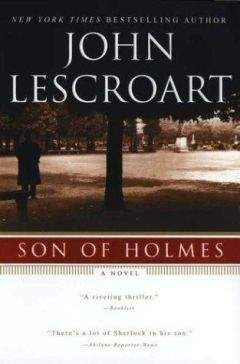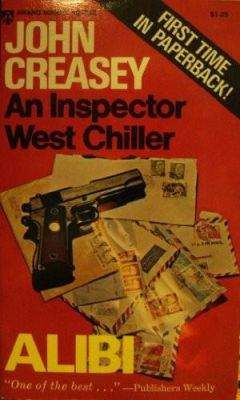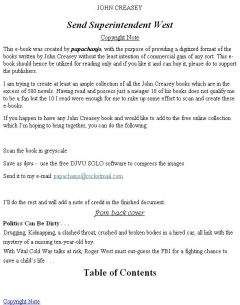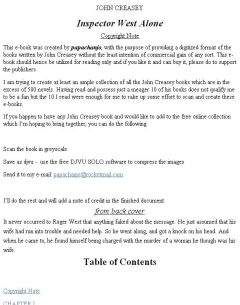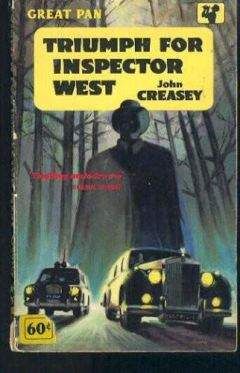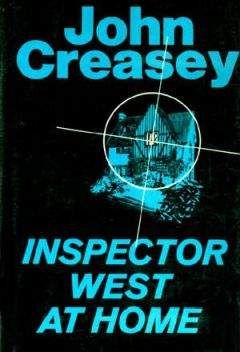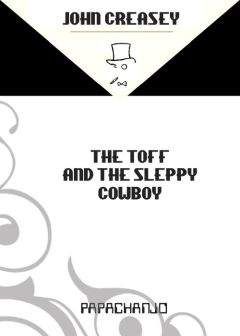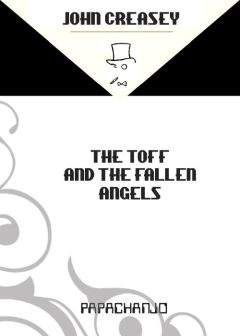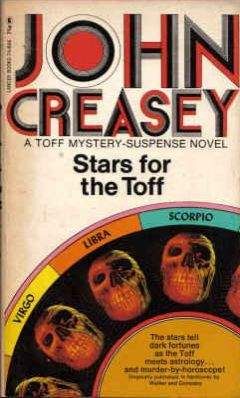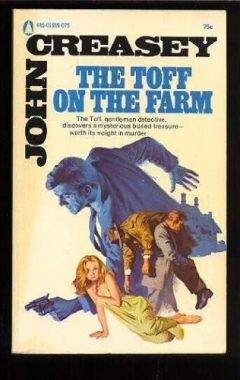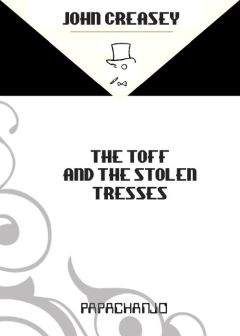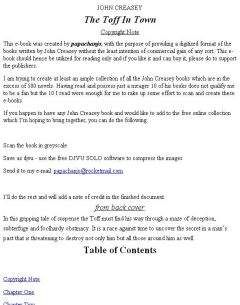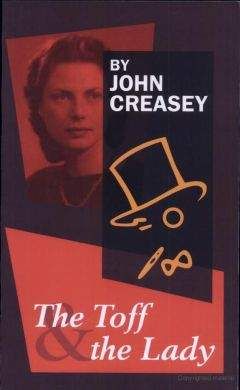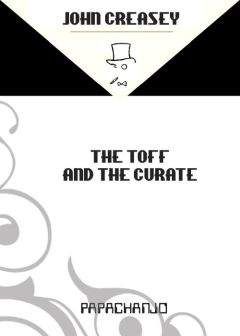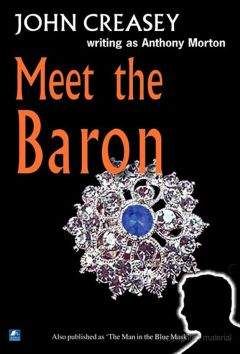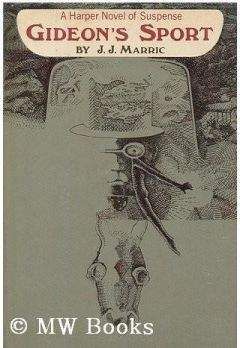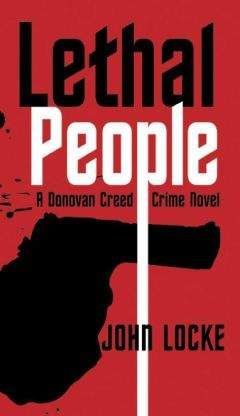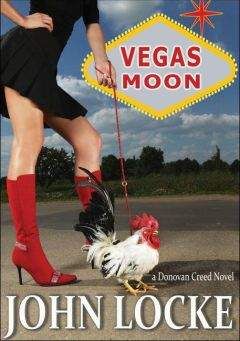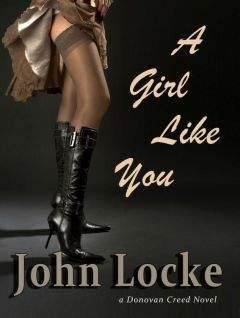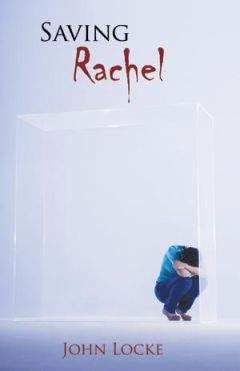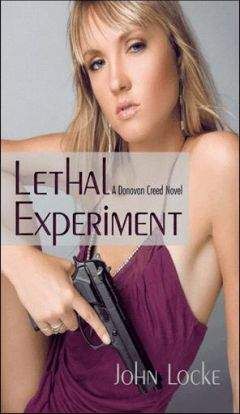John Creasey - Kill The Toff
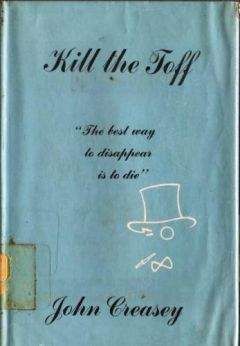
Скачивание начинается... Если скачивание не началось автоматически, пожалуйста нажмите на эту ссылку.
Жалоба
Напишите нам, и мы в срочном порядке примем меры.
Описание книги "Kill The Toff"
Описание и краткое содержание "Kill The Toff" читать бесплатно онлайн.
“No, there won’t be room for all three of us,” said Rollison. “Just keep your eyes open, will you? I don’t think we were followed but if the police were on the job they could do a lot by radio.”
He led Clarissa across the small, crowded room. In the sunlight he saw that it was spotless and freshly dusted. Clarissa didn’t ask questions but followed him submissively up the narrow steep stairs which creaked at every tread.
“Mind your head,” said Rollison and she ducked where the wall jutted out.
They reached a tiny landing. There were three doors, each of them closed; the box-room was immediately opposite the stairs.
Clarissa lowered her voice, as if the hush in the cottage demanded whispering.
“What are you going to show me?”
Rollison gripped her arm.
“Mellor.”
He felt her muscles grow tense, although he gathered that she wasn’t altogether surprised. The name had exactly the same effect on her now as it had before. She didn’t speak as he opened the door. The bed was behind the door with the head against the wall; all they could see was the foot of the iron bedstead, a bow-shaped chest of drawers with a dressing-mirror in a rosewood frame on the top of it and a small window with gay chintz curtains.
Rollison drew Clarissa in.
He stood by the window and watched her intently as she stepped past the door and looked at the sleeping man.
She took one glance, no more, and swung round on him.
“This isn’t Mellor! He’s nothing like Mellor. What are you playing at, Roily?”
CHAPTER SIXTEEN
Not Mellor?
Mellor stirred at the sound of her voice. “Look again,” whispered Rollison. “I don’t need to.”
But she peered, much more intently, into Mellor’s face. He looked tired; there was no hint of brightness or youth at his eyes and mouth, and his forehead was wrinkled in a frown, as if he could not throw off the weight of his fear, even in sleep. One arm lay over the bedspread, the fist clenched but not tightly. “Of course it isn’t Mellor,” Clarissa insisted. “We’ll go downstairs.”
Rollison waited for her to lead the way, and studied the homely face and the curly hair for a few seconds. Then he followed Clarissa, closing the door behind him softly. When they reached the parlour, she said:
“What on earth made you think it was Mellor?”
“It is.”
“Nonsense!”
“You didn’t know Mellor well, did you?”
“I shall never forget what that man looked like.”
“A beard makes a lot of difference and this one isn’t wearing a beard.”
“A beard doesn’t make a sharp aquiline nose flat, like the man’s upstairs. It doesn’t make thin lips full and friendly. It doesn’t make small, flat white ears stick out from the side of the head—I can’t understand you. I thought you knew Mellor.”
“That’s the man I know as Mellor—James Arden Mellor.” Rollison gave no emphasis to the Arden, just let the word come out casually, and watched her closely for her reaction. It didn’t come immediately.
“He’s not the Mellor I know. He—what did you say?”
“He is James Arden Mellor.”
She caught her breath. “So that’s it.” She glanced round, as if for a chair and instead sat heavily on a stool; but she didn’t look away from Rollison. “James Arden Mellor—my uncle’s love-child. Am I right?”
“Yes.”
“And that’s—that’s what you’ve been doing for him? Finding his long-lost son?”
“Yes.”
“Didn’t you know attempts were being made on his life?”
“Yes. That was incidental.”
“I don’t know why it has shaken me so much,” said Clarissa. “Since Waleski started questioning me, I’ve known there was a son. It amused me—call it malice, if you like. Uncle so strait-laced, so quick to criticise and condemn loose-living, with a bastard child running about somewhere. But after Geoffrey was killed I often wished he had another child. He’s been so desperately lonely since then. After Waleski’s taunts I found myself wondering whether uncle wished he could find the boy, whether he would like to acknowledge him. And I suppose he asked you to trace him?”
“Yes.”
“Are you sure it’s the man upstairs?”
“He was taken in by some old servants of your uncle’s who pretended he was their son, actually registered his birth. Then he was adopted by some people named Mellor, a childless couple of good middle-class standing. They were killed in the blitz when Mellor himself was in the Far East. The sticky part was tracing relatives of the Mellors who knew the truth about the child—that they’d taken him from your uncle’s old servants. They had few relatives and most thought he was a child of the marriage. But everything fell into place. There’s no real doubt that this is the natural son of your uncle and the adopted son of the Mellors, the only one they adopted. Until I heard about the East End Mellor, I didn’t think there was any possibility of casting doubt on my fancy. That’s been done with a heavy hand but, although it makes complications, it doesn’t affect Jim Mellor’s identity.”
She said: “Mellor is an unusual name but there must be hundreds of them.”
“There are but this isn’t simply a case of a name. The East End Mellor probably killed the man Galloway. Yet my Mellor is wanted for Galloway’s murder. See the cunning of it? The killer goes to earth, the police get hold of my Mellor’s photograph, the other Mellor’s gang convince the police it’s the man they want and the police go after him. What’s more scarifying, the Killer’s gang goes all out to drive Jim Mellor to suicide, too. It’s pretty obvious that Killer Mellor hopes my Mellor will be taken for him.”
Clarissa said slowly: it can’t be just that, Roily?”
“Why not?”
“You hardly need telling. If I could see at a glance that this isn’t the same Mellor, others can.”
“You didn’t spend enough enough time in the East End to learn their wiles,” said Rollison dryly. “Except for a few close friends, no one ever knew Killer Mellor well. He was seen in public occasionally, as at that dance, but if anyone who saw him that night was questioned by the police, they’d swear they didn’t remember what he looked like. Some would describe him as tall, lean, fair and clean-shaven, others as short, dark, bearded and stocky. The police wouldn’t be able to make head or tail of it. He’s never been through their hands, I doubt if they’ve fingerprints—in fact, I’m sure they haven’t, or they’d have had him before this. The first time Mellor appeared to slip up was over the murder of Galloway. Then prints were found and there was other evidence to point to this Mellor. And the police naturally assume that it’s the same one. They not only want their man for the murder of Galloway but for a lot of other crimes that will never be proved against him. They will be quite ruthless where Mellor is concerned and will take a lot of convincing that they’ve got the wrong man.”
Clarissa said: “I’m sorry if I’m slow-witted. You mean, the police couldn’t get anyone to identify the real Mellor but they’ve got this one’s photograph and they’d be able to get him identified as the killer.”
“That’s it.”
“I could swear that it wasn’t the same man,” said Clarissa. “I would swear it.”
Rollison said slowly: “That’s what makes you important. It probably explains why Waleski tried to kill you.”
“I wonder.” Clarissa wasn’t convinced. “Where does Waleski come into all this?”
“I don’t know but I suspect he’s a fence or a contact man. The Mellor gang gets a big haul and has to sell the stuff quickly. Jewels, paintings, objets d’art, costly furs—all worthless to crooks in themselves—and they can’t be held for long. They’re too hot. I’m told that none of the regular fences—”
“What exactly is a fence?”
“A receiver of stolen goods. None of the regulars, known to the police, will touch Mellor’s stuff. They know that if the police caught them with it they’d be in a bad way. But Mellor had to sell. Waleski gets around a lot, travels to and from America and the Continent; I should say he’s their contact man. Probably he’s the brains of the gang after Mellor, or even including the Killer Mellor, who’s a man of action rather than a planner. It was essential that a Mellor should die and the police should think the killer out of the way. My Mellor evaded the police for too long, so the others tried to force him to suicide, and sent a note to his girlfriend.”
“The Judith you mentioned?”
“Yes.” Rollison leaned back in his chair.
Talking was an aid to thinking. “The note was sent as “evidence” that he’d killed himself, so that no one should be hunted for his murder. The overall object, I think, was to give evidence that the Mellor gang had been smashed. Thus the police would be lulled into a false sense of security. It hasn’t quite worked out but everything will be all right provided the Mellor upstairs is caught, proved to be the gang-leader—and that can be done by false evidence—and hanged. That’s all logical enough. But I don’t know where your uncle comes in or what Waleski wants with him. He asked just for general information, you say?”
“Yes.”
“Nothing else?”
“I know you’re not convinced but I have told you the truth,” Clarissa said.
“He didn’t give you any clue about any particular piece of information that he wanted about your uncle? Apart from the lost son, I mean.”
“No, I think he was just stringing me along,” said Clarissa. “And I told him about meeting my Mellor. He started to talk about the East End of London and the gangs, because there was an article in the Continental Daily Mail about them: I told him about the girl—all I told you last night. I laughed it off with him, hut—”
“Waleski knows you can identify Killer Mellor, so wants you dead and that puts you on the spot.” Rollison was brusque. “Better accept that and be very careful. Have you ever come across a man named Dimond?”
Clarissa hesitated.
Rollison said sharply: “Have you?”
“Well—”
“This might be vital.”
“I have, yes,” said Clarissa slowly, it’s a name you easily remember, isn’t it? I met him for a few minutes at the Hotel de Paris. Waleski had some business with him and said he was a diamond merchant. He made great play on the name—Dimond the diamond merchant.” She leaned forward, her voice pitched low, her expression eager. “I remember him well, because he was so absurdly handsome in an unpleasant way. He spoke good English, but I thought he was probably part Oriental. Sleek black hair, rather sallow skin—handsome as some Arabs are handsome. Do you know the type I mean?”
“You’re good at descriptions, Clarissa. And you’ve become a vital witness. You can identify Dimond, Waleski and the real Mellor, so we’ll have to take great care of you.”
Clarissa said: “Are you trying to frighten me?”
“No. To warn you. Waleski will almost certainly try again and next time might—”
“Succeed,” said a man at the window.
Rollison sprang up, turning towards the window. Clarissa exclaimed—and Waleski stood at the window covering them with a gun, grinning at them. A heavy footstep sounded in the passage; the door of the room opened and a small, wiry little man appeared, also carrying a revolver which looked too big and heavy for him.
“I’ll succeed all right,” said Waleski. “Watch ‘em, Fryer.”
The little man’s gun covered them as
Waleski disappeared from the window.
* * *
He came into the room, still grinning, and the sun shone on his heavily-oiled hair and on the pale bald spot. His broad flat face had an evil look, his wide-spaced teeth showed. He walked with a swagger. His left hand was heavily bandaged and he held his arm up, close to his chest. He crossed to Clarissa’s side and pushed the barrel of the gun against her nose with a jerk which hurt her.
“Not your lucky day, Clarry, is it?” Then he turned to Rollison. The grin disappeared, naked enmity replaced it. “And it certainly isn’t yours, Rollison. Won’t your pal Grice be pleased when he finds the body?”
Rollison said: “Yes, he loves chasing murderers.”
“Still clever, are you?” Waleski backed away, as if he were afraid that Rollison would push the gun aside; but that would have been of no use for Fryer was covering them both from the doorway of the little, crowded room. “Grice won’t have to look for a murderer, see? Mellor’s upstairs. Mellor is going to kill the pair of you and then die of wounds. It’s easy. We’ll do the shooting, wrap your hand round one gun and his round another. The little guy outside will get his, too.”
“Ah,” murmured Rollison. “Snub.”
“We got him with the air-gun,” Waleski boasted. “And we’ll finish him off with something more powerful. Where’s the old woman?”
“Out shopping.”
“She knows a thing or two,” said Waleski and laughed. “Feeling good, Rollison?”
“I’ve felt worse.”
“You’ll change your mind. What a lot of time you’ve wasted, trying to do the impossible.”
“It’s almost the only thing worth trying to do,” Rollison said easily. “Sit down, Clarissa.”
“You stay where you are,” Waleski said, “Dying will be another new sensation for you, Clarry. See where it leads you when you ignore an old man’s advice! If you’d been a good girl, like your uncle told you, this wouldn’t have happened.”
“You seem to know a lot,” said Rollison.
“It wouldn’t be difficult to know more than you do,” Waleski sneered. “But maybe that’s not fair.” He feigned remorse, shook his head, then grinned from sheer animal spirits. “Better be fair, Rollison, hadn’t I? I was listening in to your pretty piece just now and you’ve got it all right. But you didn’t know I had a man watching the cottage, did you? I knew you had Mellor. I reckoned you’d tell the old man and take Mellor to the Lodge or here. I had a couple of other places watched, owned by friends of yours, where you might have gone. I knew Ebbutt and his mob wouldn’t lift a hand to help Mellor, see. Got it all worked out, haven’t I?”
“Not bad.”
“Not bad—it’s hot, Rollison! One of the smartest jobs you’ve ever come across. And I’m good! I could have wiped Mellor and your snub-nosed pal out last night but I thought you’d be along soon. I didn’t think you’d bring Clarry, though. Very obliging of you, Mister Rollison.”
Into a pause, Fryer said: “We haven’t got all day.”
“Why, so we haven’t!” Waleski grinned again. “Hear that, Rollison? We haven’t got all day. It will take half an hour to get your prints on the guns and leave the evidence for old Grice, won’t it?”
“S’right,” grunted Fryer.
“So we’d better get busy. Know where a bullet hurts most, Rollison?” Suddenly he raised his foot and kicked Rollison in the pit of the stomach; not hard, just enough to hurt. “Right there,” he sneered. “Then you can tell me if you’ve ever felt worse. Fryer—”
Подписывайтесь на наши страницы в социальных сетях.
Будьте в курсе последних книжных новинок, комментируйте, обсуждайте. Мы ждём Вас!
Похожие книги на "Kill The Toff"
Книги похожие на "Kill The Toff" читать онлайн или скачать бесплатно полные версии.
Мы рекомендуем Вам зарегистрироваться либо войти на сайт под своим именем.
Отзывы о "John Creasey - Kill The Toff"
Отзывы читателей о книге "Kill The Toff", комментарии и мнения людей о произведении.





